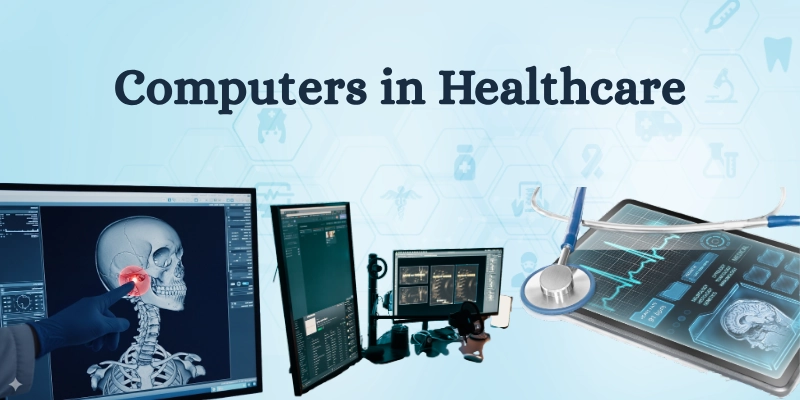Computers in Healthcare: Revolutionizing Modern Medicine
Published: 19 Sep 2025
Computers in healthcare have transformed medicine, making diagnosis and treatment faster, easier, and more accurate. The role of computers in healthcare is now essential, from managing patient records to supporting surgeries.
This article will explore the role of computers in healthcare, their benefits, key computer applications in healthcare, and the future of healthcare technology, including the use of medical computers and healthcare IT.
Role of Computers in Healthcare
The role of computers in healthcare is to help store, analyze, and share medical information efficiently. They make it easier for doctors and nurses to access patient data, improve hospital management, and support medical research.

Computer use in hospitals includes managing appointments, tracking treatments, and monitoring patient health. One common example is Electronic Health Records (EHR), which allow doctors to view a patient’s complete medical history quickly.
Medical computer systems also help in research by analyzing large amounts of medical data to find patterns, develop new treatments, and improve patient care.
Types of Computers Used in Healthcare
Healthcare uses different types of computers to manage patient data, support diagnosis, and improve treatment. These systems range from small devices for monitoring patients to large computers for managing hospital information.
Here are some types of computers used in healthcare.
- Desktop Computers:
Desktop computers are widely used in hospitals for tasks like hospital administration and patient record management. They help staff access and update patient information quickly, schedule appointments, and handle day-to-day hospital operations efficiently. - Laptops and Tablets:
Laptops and tablets are portable devices used by doctors and nurses during hospital rounds. They allow medical staff to access patient records, enter new information, and review test results on the go, making healthcare delivery faster and more efficient. - Servers and Cloud Systems:
Servers and cloud systems are used to store large amounts of patient data securely. They allow hospitals to access medical records, test results, and other information from anywhere, making computer use in hospitals more efficient and supporting advanced healthcare IT systems. - Medical Devices with Embedded Computers:
Many medical devices have embedded computers that help in diagnosis and treatment. Examples include MRI machines, X-ray machines, CT scanners, and heart rate monitors. These medical computers process complex data quickly, improving accuracy and patient care.
Applications of Computers in Healthcare
Computers are widely used in healthcare to improve patient care, manage records, and support medical research. They help doctors, nurses, and hospitals work more efficiently and make accurate decisions.
Here are some applications of computers in healthcare.
- Electronic Health Records (EHR):
Electronic Health Records (EHRs) are used for the digital storage of patient data. They allow doctors and nurses to access medical history, test results, and treatment plans quickly. The benefits of EHR include easy access to information, faster diagnosis, and fewer errors in patient care. - Medical Imaging:
Medical imaging uses computer systems to power MRI machines, CT scans, and X-rays. These technologies provide doctors with better visualization of the body’s internal structures and help in accurate analysis for diagnosis and treatment planning. - Telemedicine:
Telemedicine uses computers and the internet to provide remote consultations. Doctors can diagnose and advise patients without them visiting the hospital, which improves access to healthcare, especially in remote areas. This is an important computer application in healthcare that saves time and makes medical care more accessible. - Laboratory and Research Applications:
Computers in healthcare are widely used in laboratories and research. They help with data analysis, run simulations, and support drug discovery. These applications allow scientists and doctors to process large amounts of information quickly, leading to faster medical breakthroughs and improved patient care. - Hospital Management Systems:
Hospital management systems use computer applications in healthcare to handle tasks like scheduling, billing, inventory management, and patient tracking. These systems make hospital operations smoother, reduce errors, and save time for medical staff, improving overall patient care.
Advantages of Using Computers in Healthcare
Computers have transformed healthcare by making medical processes faster, safer, and more efficient. They play a key role in diagnosis, treatment, patient care, and research.
- Accurate Diagnosis: Digital tools and imaging systems help doctors identify medical problems correctly.
- Faster Treatment Decisions: Doctors can make quick decisions, ensuring patients receive timely care.
- Reduced Paperwork and Human Errors: Medical computers store and organize patient data efficiently, minimizing mistakes.
- Better Patient Monitoring: Real-time tracking of patient health improves care quality.
- Improved Research and Innovation: Computers help analyze data, run simulations, and develop new treatments faster.
Challenges and Disadvantages
Although computers have greatly improved healthcare, they also come with some challenges. Understanding these disadvantages of computers in healthcare helps hospitals prepare and manage risks.
- High cost of implementation: Setting up medical computers and systems can be expensive.
- Cybersecurity risks and data privacy issues: Patient information can be vulnerable to attacks.
- Reduced human judgment: Over-reliance on technology may affect critical decisions.
- Need for trained staff: Staff must be skilled to operate computer systems in hospitals.
- Technical failures: System crashes or software errors can disrupt healthcare operations.
Future of Computers in Healthcare
The future of computers in healthcare looks exciting, with many new technologies improving patient care and hospital efficiency:
- AI-powered diagnostic systems: AI in healthcare can analyze medical data quickly to help doctors make faster and more accurate diagnoses.
- Robotics in surgeries: Robots guided by computers assist surgeons in performing precise and minimally invasive operations.
- Wearable health monitors with IoT: Smart devices track vital signs and send real-time data to doctors for better patient monitoring.
- Predictive analytics for disease prevention: Computers can analyze trends and predict health risks before they become serious.
- Cloud-based patient care and big data management: Storing and managing large amounts of medical data in the cloud supports smart healthcare technology and improves hospital efficiency.
Conclusion
Computers in healthcare are making medicine faster, safer, and more efficient. The role of computers in medicine is vital, from patient records to advanced medical devices.
With proper management, the benefits outweigh the challenges. The future of healthcare technology looks bright with AI, smart devices, and cloud systems.
Stay updated with the latest in healthcare technology and see how computers continue to transform medicine!
FAQs
Got questions about computers in healthcare? Find your answers here!
Computers help track patients’ vital signs in real time, alerting doctors to any sudden changes. They also store this data for easy review and trend analysis to improve care.
The role of computers in healthcare is to manage medical information efficiently and support doctors in diagnosis and treatment. They also help streamline hospital operations and enhance patient care.
Computers in healthcare make patient care faster, more accurate, and organized. They also help reduce errors, improve communication, and support advanced medical treatments.
Computers help medical researchers analyze large amounts of data quickly and run simulations for experiments. They also assist in discovering new drugs and understanding disease patterns.
EHR, or Electronic Health Records, is a digital system for storing patient medical information. It allows doctors and nurses to access, update, and share patient data easily and securely.
AI and computers are improving healthcare by analyzing medical data quickly and helping doctors make accurate diagnoses. They also assist in personalized treatment plans and automate routine tasks for better efficiency.
Computers track patients’ vital signs continuously and alert medical staff to any unusual changes. They also record the data for future analysis to ensure better care.

- Be Respectful
- Stay Relevant
- Stay Positive
- True Feedback
- Encourage Discussion
- Avoid Spamming
- No Fake News
- Don't Copy-Paste
- No Personal Attacks

- Be Respectful
- Stay Relevant
- Stay Positive
- True Feedback
- Encourage Discussion
- Avoid Spamming
- No Fake News
- Don't Copy-Paste
- No Personal Attacks





